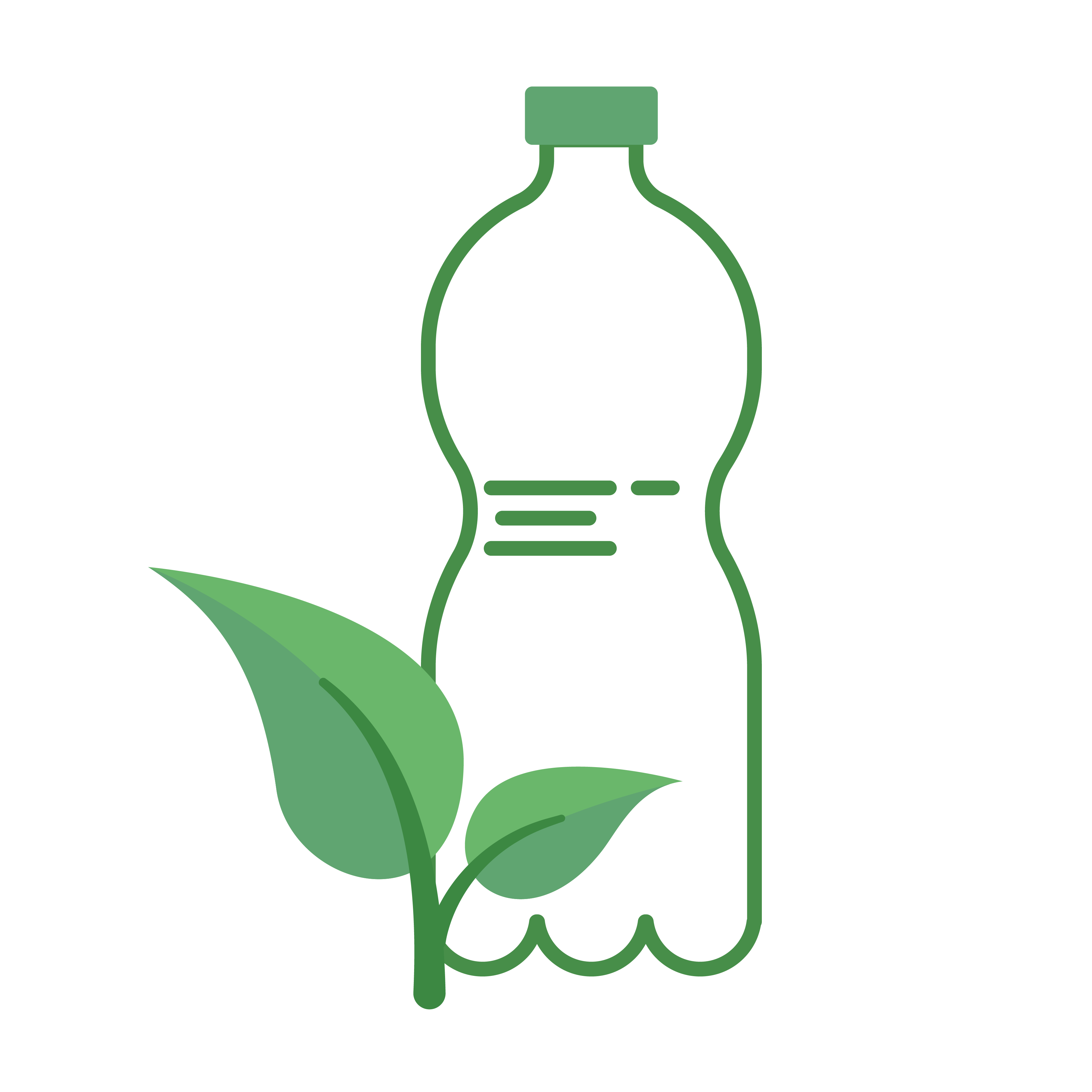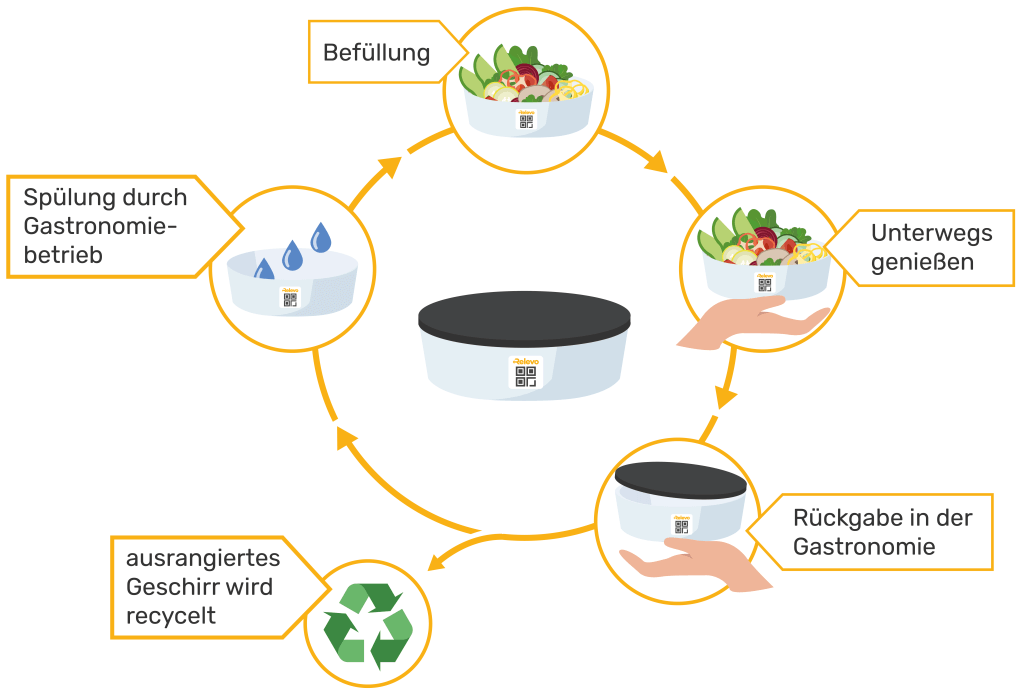Focus on Sustainability: Packaging Variants in the To-Go Business
To-go has become indispensable today. Guests now expect to be able to take food, drinks and snacks with them. At the same time, the environment should be burdened as little as possible. This development has not stopped at system catering either. For canteens and catering, it is particularly important that out-of-home business can be integrated smoothly into existing processes.
Caterers in the communal catering sector are therefore looking for solutions that minimize the workload for employees and at the same time contribute to sustainability goals. They often end up using organic disposable packaging. In this article you will learn:
- How different types of organic disposable tableware differ
- The advantages and disadvantages associated with organic disposables
- How reusable performs as an alternative
What does the “organic” in organic disposable actually mean?
The answer to this question seems too obvious to say at first: “bio” stands for biological, of course! However, what this means in terms of packaging turns out to be quite complex. It is important to differentiate between bio-based and biodegradable plastics, which are the materials used to make bio-based single-use packaging.
Bio-Based Plastics

Bio-based plastics are made from renewable raw materials, such as corn, wood or sugar cane, instead of fossil fuels. The resulting plastic only has to be partially derived from plant material to be considered bio-based. Bio-PET bottles, for example, only consist of 30% biological components. And: only a few bio-based plastics are also biodegradable.
Biodegradable Plastics
All plastics that decompose in the environment are biodegradable. As a rule, they decompose into CO2 and water. However, biodegradable plastics are not necessarily made from sustainable materials. For example, there are also petroleum-based plastics such as PCL that are biodegradable.
What exactly is meant by single-use biodegradable packaging and how it should be handled can therefore be very different.
Different types of organic disposable tableware
Let’s now take a closer look at some types of disposable organic packaging that are used particularly frequently in everyday catering.
Paper/cardboard
The lightweight cardboard boxes are no longer just for classic delivery pizzas. We also come across salads, pasta and bowls in all kinds of cardboard boxes. For these greasy and moist foods, however, the cardboard is coated on the inside with a plastic layer to make the packaging tear-resistant. Such coated boxes must then be disposed of in the recycling garbage can and do not belong in the paper waste.
Bagasse
Bagasse is the fibrous residue from the processing of sugar cane. When mixed with water, a paste is produced from which polystyrene-like packaging is made. The trays are not only resistant to heat and cold, but also to water and grease, making them suitable for almost all foods. Bonus: The material is compostable in accordance with the DIN standard.
Palm leaf
Another alternative for organic disposables is made from the leaves of the betel nut palm: The pressed bowls and plates are naturally water-repellent and particularly dimensionally stable. Due to this stability, however, plastic is usually used again for the closure of the take-away packaging.
Advantages of organic disposables
Whether palm, wood or sugar cane: disposable packaging made from renewable raw materials is lightweight and stackable, making it practical to handle in system catering, even in large quantities.
Moreover, no additional work steps are required for hygiene – the packaging can simply be handed out.
Now you’re probably expecting us to emphasize the environmental friendliness of organic disposables. But that’s where things get tricky…
Disadvantages of organic disposables
As already mentioned several times above, disposable organic tableware often consists of material composites that can hardly be separated. Even pure bio-based plastics often cannot be recycled in sorting plants because their chemical structure differs from that of conventional plastics. Most single-use organic packaging therefore shares the same fate: it is simply incinerated.
Even compostable packaging, such as those made from bagasse, frequently fails to meet their purpose in a cafeteria environment. Since guests do not have access to composting facilities, these containers often end up overflowing in general waste bins.
Although bioplastics actually release less CO2 during production than fossil-based materials, the greater amount of land required to grow the raw materials negates this advantage.
Overall, the Federal Environment Agency also comes to the conclusion that the eco-balance of single-use bioplastics is no better than that of fossil-based plastics. Additionally, the costs of organic packaging are also significantly higher.
So what to do?
The cost-effective and sustainable alternative: reusable
The solution is offered by reusable systems in which caterer serve food to guests in robustly manufactured trays. Guests either pay a deposit to the reusable provider or – as in the case of Relevo – simply arrange for the food to be borrowed and returned without a deposit via an app.

This system has many advantages:
- Most sustainable to-go solution: reusable tableware only needs to be used a few times to have a better eco-balance than organic disposables. Relevo tableware made of glass or SAN plastic can be reused 1000-2000 times.
- Better customer loyalty: By returning reusable containers, customers are encouraged to visit more frequently and often make additional purchases. As a catering partner in the Relevo network, you also benefit from visibility in the Relevo app and gain new customers.
- Save costs: Even if the cleaning process is included, restaurants save 30-40% per serving with Relevo compared to organic disposable tableware.
Relevo takes over inventory control for your business and organizes rentals and returns. The reusable solution is integrated overnight – without disrupting your processes!
If you have any questions about our Relevo reusable system, our team is always happy to help:

